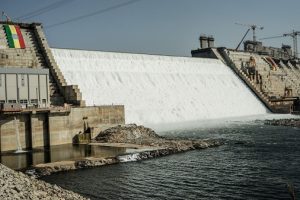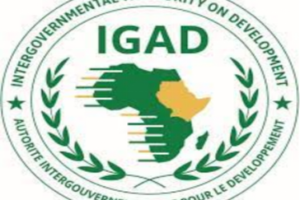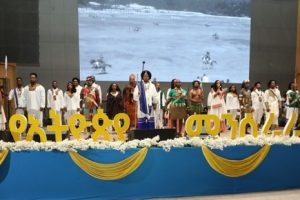BY FITSUM GETACHEW
‘Ethiopia finds itself at a very crucial crossroad’ is a statement we are very familiar with. Perhaps this time, more than in the previous times, there is a general feeling that Ethiopians do not feel that comfortable with what is going on in the country. Every one of them may present their own version of the facts and argue why they feel frustrated, if not desperate, about the destiny of their country. Some even venture to the extreme extent of doubting if they have a country at all, at least as they have always known it! ‘Pessimism at worst,’ one could say. They say lately there has been clear and visible sense of depletion of the spirit and feeling of nationalism focusing unfortunately more on a sense of ‘ethnic identity’. But they realize this must be a result of what has been persistently sown extensively during the past three decades or so. Division facilitates easy rule.
If one follows assiduously the various facets of the country today, the probable impression one may have is that there are more shades than lights, more uncertainties than certitudes, more reluctance to bounce ahead with a clear vision than steadfast and committed engagement with a bright future in front. Pessimism seems to cast its shade on many.
On the other hand, however, we can console ourselves because our history shows that Ethiopians are spiritual people (rather fatalists) because they believe that whatever the Lord has reserved them will take place. They firmly believe that no one can be spared of whatever destiny reserves them. Some may assert this could be a dangerous and retrograde mentality which has always constituted a huge stumbling block to the advancement of the nation. But it could also be taken as one that could keep the hope of citizens alive continuing to rely on confidence and trust in the Creator. They conclude the final say belongs to Him!
A lot has been said and written about the link between Ethiopians and their Creator as having a continuous and pivotal role in determining their state of mind and subsequent actions. At the same time however, they continue to strive to save their country from whatever challenges it may have to face.
In the wake of this post-election season we are in, Ethiopians hope there will be some sort of ‘legitimate government’ finally and for the first time in decades. Many people are nostalgic about the 2005 elections season remembering the atmosphere in the pre-election situation, the way the campaigns were conducted, the way the promotions were facilitated and materialized, the way the media transmitted the campaigns many times live and direct, and the quality and personality of the participants contending the elections. We still remember how the political parties felt treated more or less on an equal footing with the ruling party (in a clear departure of what used to be done earlier) and the fourteen years stay of the EPRDF was then severely tested.
Some would even add that it was clearly defeated by the same game it allowed to be played and subsequently regretted to never again let any similar ‘democratic opening’ because it feared it would jeopardize its monopoly of power! There was the feeling that any seriously organized opposition would be in a position to defeat the TPLF-dominated EPRDF if there were to be conducted ‘free and fair’ elections! It recognized its weaknesses and began to overcome its fragility through the use of naked and ruthless force against any perceived threats. People were presented with the ugliest face of the system! Resorting to pure violence and intimidation taking full advantage of the total control of all the security and law enforcement apparatus became the identity of the system!
The post-2005 election season goes down to history as the harshest for the citizens who had faith in the purported democratic system but were openly and shamelessly ‘betrayed’!
As much as that election was considered the most democratic envisaged, however, the consequences that followed the aftermath was also a defining moment for the country’s future. For many it was a nightmare! The immediate consequence was that all the promised openings were completely frustrated. Leaders of the opposition were all harassed, detained and tortured while the Calvary of the Ethiopian people who entertained any sympathy with the opposition were made to suffer in many ways. The aura of the democratic trajectory was totally eclipsed once and for all.
We recall western countries did condemn the violence in the after math of the 2005 elections while former Prime Minister Meles and company saved their reign by resorting to the most repressive of methods, very familiar and déjà vu in other African countries. The Western partners of that regime did express their disappointment and dismay in many ways, but they did not let it go down the drains. What they are trying to do now seems to be totally contrary to their policies of those days! One wonders ‘Have the criteria suddenly changed’?
The elections that we have just gone through this year may not be compared to the 2005 elections in many respects, but the independence of some democratic institutions such as the Election Board has resulted to be a positive development. The reform in the judiciary also may be considered as another force. But at the same time, the extremist position of certain ‘narrow ethnicist’ parties leaves a lot of space to destructive forces. Given the critical political situation in terms of the country’s relations with the international community, the strained diplomatic relations with some, it would have been a time when the entire country would need to stand united and show full solidarity and resolve to reject emphatically all forms of foreign interference!
For many the reform that everyone hoped would change the political scenario of the country three years ago cannot be considered as a full success story. There have been incidents of disappointments in the way the politics of the post EPRDF Ethiopia has been conducted. Many people were heard complaining and even warning that the reform has been ‘hijacked’. Certain ‘extremist’ forces that are somehow hidden in the internal circles of the palace seem to prefer to advance their own extremist political agenda, distant light years from the original ideas with which the premier was associated. He did attract the admiration and appreciation of the majority of the population. Many have argued however that the prime minister could not help settling with a sort of compromise with some of these elements who came all the way with him the hard and tortuous lanes in the battle for the leadership.
Many observers have asserted that the narrow ethnic motivated or guided spirit and the hardened feelings of some political groups could not help advance or facilitate the process for the realization of the national agenda and the long-term vision the premier is perceived to advance. First of all, there persist disagreements on the way the history of the country should be understood and narrated. Many dwells a lot on its being ‘full of injustices’. There are also narratives conducted by some that there must be done more justice to people who traditionally have allegedly been mistreated with their fundamental rights breached by previous regimes.
Moreover, there is also another dispute on the way this story must be taught in schools. At the same time, however people must realize that the country cannot spare so much time with these seemingly insignificant agendas proposed and promoted by old political doctrines and forces who continue to ‘live in the past’ rather than project their thoughts in view of the present generation and the future. Here one can clearly observe a challenging dilemma for this government, and any government for that matter, even in the post-election scenario.
Of course, there is admission and consensus that substantial change has been introduced in our politics. The key forces and leaders of the past three decades have been deposed or totally rid of in the ‘law enforcement campaign’ prompted by the tragic incidents of last November. Hence, the situation in Ethiopia is pretty much complex and to a large extent new, so to say. The country is traveling in ‘uncharted territory’. We do not recall it navigating in such turbulent waters although the history of the country is full of severely challenging episodes. Some say miracles have happened in the past to save the country and there is no reason why this time around as well it does not materialize! This sounds pure optimism!
Nonetheless, more seriously, many consider this as an opportunity to take full advantage of even if in other similar circumstances in which Ethiopians found themselves they do not have a history of success or full exploitation of the occasions. Historians say the country rather has a history of ‘missed opportunities’. For some hence this continues to be a troubling development to ponder on.
Today, there are too many hard challenges because there is the tragic situation in the north of the country; there is the diplomatic challenge that has followed this development; traditional allies seem to have turned their face backwards and they are heard pronouncing dangerous rhetoric that accuses the incumbent of untold atrocities and human rights violations. But these are the same governments who never spoke with equal vigour and candor when their former allies (who used to be at the helm of the Ethiopian government) were accused of committing several untold human rights violations, many times profiling nationals ethnically.
The diplomatic challenge presented by these western countries who were once ‘reliable allies’ has presented itself in front of Ethiopians as a danger for the economy and the future trajectory of the country. There are people who believe that the firm stance that the government of Abiy Ahmed has taken in this regard risks taking the country to an ‘undesirable direction’, pushing it probably to rely more on the likes of China and Russia. This is probably what the western nations would not be delighted to envisage.
It should also be noted that the election this year has benefited from a relatively well organized and independent National Electoral Board while the same could be said of the judiciary, the mass media and the way the elections were observed by multiple neutral forces. Plus no one should undermine or dismiss the immense power of social media, a phenomenon that was never such a force during any one of the past elections.
Today people seem even ‘addicted’ to these social media and they could play a huge role in the ongoing political battle. Many estimate that the ruling party may conserve most of its seats for a number of reasons, but we still do not have the guarantees that its expectations may be totally met. It is difficult to gauge and quantify the ‘feelings’ or ‘moods’ or preferences of Ethiopians. They have evidently been exposed to multiple sources of pure propaganda. The ruling party was made to be viewed as the elder brother of the much-despised EPRDF. However, we should also not forget that people say ‘better the devil I know than the angel I do not!’ Change is not always embraced immediately by Ethiopians because there is tendency to own scarce confidence in new faces.
What Ethiopians do hope about however is that the country continues united, dismissing the fragmentary ethnic oriented politicians who trade narrow nationalistic grievances and grudges. If the winning party can tackle these challenges with success, then it may consider itself capable of consolidating power and may be advance the necessary policy proposals the country desperately needs to implement. ‘A government of national unity’ is what many aspire to see because a divided house cannot stand upright! The challenges of the day do not offer better alternatives.
THE ETHIOPIAN HERALD JUNE 24/2021




